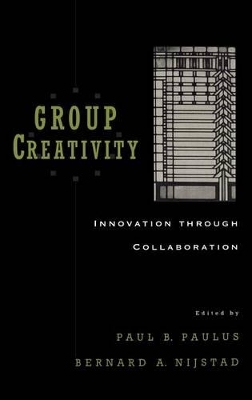
Group Creativity
Innovation through Collaboration
Seiten
2003
Oxford University Press (Verlag)
978-0-19-514730-8 (ISBN)
Oxford University Press (Verlag)
978-0-19-514730-8 (ISBN)
Creativity is important for the continuous development of organizations, science and society. With the information explosion, the development of innovations will increasingly require group interaction at some stage of the process. This volume addresses the relation between group processes, group context, and creativity.
Creativity often involves the development of original ideas that are useful or influential. Most research and writing on creativity has focused on individual creativity. However, with the information explosion and growing necessity of specialisation, the development of innovations will increasingly require group interaction at some stage of the process. Most organisations and much of the scientific process now rely on work of teams with diverse skills and knowledge. Fortunately, in recent years there has been an increasing acknowledgement of the importance of social and contextual factors in creativity. Group Creativity summarises the exciting new developments in the research on the processes involved in group or team creativity and innovation.
The volume draws from a broad range of perspectives, such as cognition, groups, creativity, information systems, and organisational psychology. These different perspectives have been brought together in one volume in order to focus attention on this developing literature and its implication for theory and application. The chapters of this volume are organized into two sections. The first section deals with group processes in creative groups, and considers issues of cognitive fixation and flexibility, group diversity, minority dissent, group decision-making, brainstorming, and group support systems. Special attention is devoted to the various processes that can inhibit or facilitate group creativity. Although much research on group processes has demonstrated that groups often fail to meet their productivity or problem solving potential, recent studies have highlighted conditions and processes related to effective functioning of teams or groups that work on creative tasks. The second section deals with the impact of various contextual or environmental factors on the creative group process. The chapters deal with issues of group autonomy, group socialisation, mentoring, team innovation, knowledge transfer, and creativity at the level of cultures and societies. It is argued that a full understanding of group creativity cannot be accomplished without adequate attention to the group environment.
The volume provides a basis for future theoretical development and application. It will be a useful source of information for scholars, practitioners and students and can be used as a textbook on courses on creativity and innovation.
Creativity often involves the development of original ideas that are useful or influential. Most research and writing on creativity has focused on individual creativity. However, with the information explosion and growing necessity of specialisation, the development of innovations will increasingly require group interaction at some stage of the process. Most organisations and much of the scientific process now rely on work of teams with diverse skills and knowledge. Fortunately, in recent years there has been an increasing acknowledgement of the importance of social and contextual factors in creativity. Group Creativity summarises the exciting new developments in the research on the processes involved in group or team creativity and innovation.
The volume draws from a broad range of perspectives, such as cognition, groups, creativity, information systems, and organisational psychology. These different perspectives have been brought together in one volume in order to focus attention on this developing literature and its implication for theory and application. The chapters of this volume are organized into two sections. The first section deals with group processes in creative groups, and considers issues of cognitive fixation and flexibility, group diversity, minority dissent, group decision-making, brainstorming, and group support systems. Special attention is devoted to the various processes that can inhibit or facilitate group creativity. Although much research on group processes has demonstrated that groups often fail to meet their productivity or problem solving potential, recent studies have highlighted conditions and processes related to effective functioning of teams or groups that work on creative tasks. The second section deals with the impact of various contextual or environmental factors on the creative group process. The chapters deal with issues of group autonomy, group socialisation, mentoring, team innovation, knowledge transfer, and creativity at the level of cultures and societies. It is argued that a full understanding of group creativity cannot be accomplished without adequate attention to the group environment.
The volume provides a basis for future theoretical development and application. It will be a useful source of information for scholars, practitioners and students and can be used as a textbook on courses on creativity and innovation.
PART I: GROUP PROCESS AND CREATIVITY; PART II: GROUP CREATIVITY IN CONTEXT
| Erscheint lt. Verlag | 1.10.2003 |
|---|---|
| Zusatzinfo | numerous figures |
| Verlagsort | Oxford |
| Sprache | englisch |
| Maße | 166 x 241 mm |
| Gewicht | 617 g |
| Themenwelt | Geisteswissenschaften ► Psychologie ► Allgemeine Psychologie |
| Geisteswissenschaften ► Psychologie ► Arbeits- und Organisationspsychologie | |
| Geisteswissenschaften ► Psychologie ► Sozialpsychologie | |
| Geisteswissenschaften ► Psychologie ► Verhaltenstherapie | |
| Sozialwissenschaften ► Soziologie | |
| ISBN-10 | 0-19-514730-8 / 0195147308 |
| ISBN-13 | 978-0-19-514730-8 / 9780195147308 |
| Zustand | Neuware |
| Haben Sie eine Frage zum Produkt? |
Mehr entdecken
aus dem Bereich
aus dem Bereich
Techniken der Verhaltenstherapie
Buch (2024)
Julius Beltz GmbH & Co. KG (Verlag)
35,00 €


